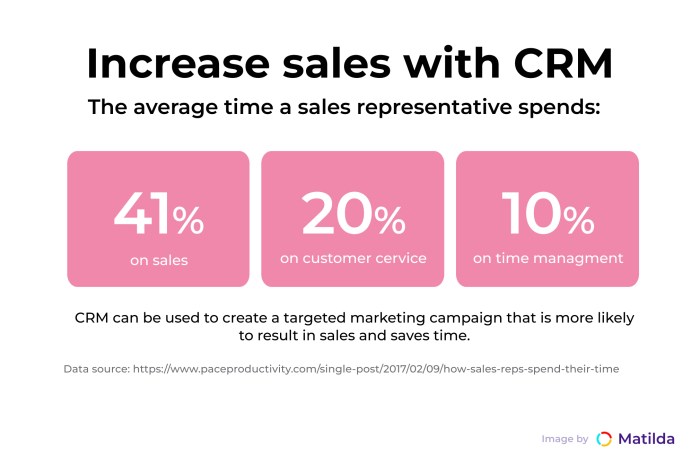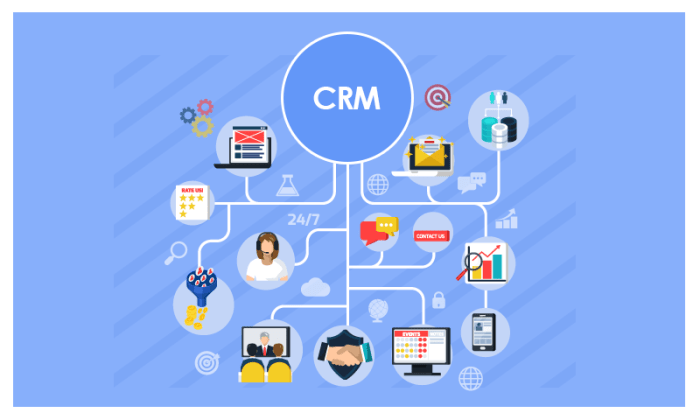Maximizing sales with CRM tools sets the stage for this enthralling narrative, offering readers a glimpse into a story that is rich in detail and brimming with originality from the outset. In today’s competitive market, utilizing CRM tools effectively can be the key to unlocking higher sales figures and fostering lasting customer relationships.
As we delve deeper into the realm of CRM tools, we uncover the transformative power they hold in tracking customer interactions, optimizing marketing strategies, and enhancing sales team productivity. This comprehensive guide will equip you with the knowledge needed to harness the full potential of CRM tools for maximizing sales and driving business growth.
Importance of CRM tools in sales maximization
CRM tools play a crucial role in maximizing sales by helping businesses effectively manage and nurture their customer relationships. These tools provide valuable insights into customer interactions, streamline lead management processes, and enhance customer retention strategies.
Tracking customer interactions
CRM tools enable businesses to track every customer interaction, including emails, calls, meetings, and purchases. By centralizing this data, organizations can gain a comprehensive view of each customer’s journey, preferences, and needs. This information allows sales teams to personalize their approach and tailor their offerings to meet individual customer requirements.
When investigating detailed guidance, check out Best practices for CRM implementation now.
Lead management
CRM tools facilitate lead management by organizing and prioritizing leads based on their likelihood to convert into customers. By tracking lead activities and engagement levels, businesses can identify the most promising opportunities and focus their efforts on converting them into sales. This targeted approach helps sales teams optimize their resources and increase their conversion rates.
Improving customer retention, Maximizing sales with CRM tools
CRM tools are instrumental in improving customer retention by enabling businesses to provide personalized and timely support to their existing customers. By analyzing customer data and behavior patterns, organizations can anticipate their needs, address any issues proactively, and offer relevant recommendations. This level of personalized service fosters customer loyalty and encourages repeat purchases, ultimately driving sales growth.
Utilizing CRM data for targeted marketing strategies

In today’s competitive market, utilizing CRM data for targeted marketing strategies is crucial for businesses to stay ahead of the curve. By leveraging customer data effectively, companies can create personalized marketing campaigns, identify customer preferences, and segment customers for targeted promotions.CRM data can be used to create personalized marketing campaigns in the following ways:
Personalized Email Campaigns
- By analyzing customer purchase history and behavior, businesses can send personalized product recommendations via email.
- Using CRM data, companies can segment customers based on their preferences and tailor email content accordingly to increase engagement and conversions.
Analyzing CRM data is essential for identifying customer preferences:
Customer Preference Analysis
- By examining customer interactions with the company, businesses can gain insights into their preferences, such as preferred products or communication channels.
- Understanding customer preferences allows companies to tailor their marketing messages and offers, increasing the likelihood of conversion.
CRM tools play a vital role in segmenting customers for targeted promotions:
Customer Segmentation
- CRM systems enable businesses to categorize customers based on demographics, behavior, or purchase history, allowing for targeted marketing campaigns.
- Segmenting customers helps companies deliver relevant promotions to specific groups, improving ROI and customer satisfaction.
Enhancing sales team productivity with CRM tools: Maximizing Sales With CRM Tools

In today’s competitive business landscape, maximizing sales team productivity is crucial for achieving success. By leveraging CRM tools effectively, sales teams can streamline processes, boost efficiency, and drive revenue growth. Let’s explore how CRM tools can enhance sales team productivity.
Streamlining Sales Processes and Improving Efficiency
- CRM tools centralize customer data, eliminating the need for manual data entry and reducing administrative tasks for sales reps.
- Automated workflows in CRM systems help sales teams prioritize leads, follow up with prospects, and track sales activities more effectively.
- Integration with other sales tools such as email marketing platforms and project management software streamlines communication and collaboration within the team.
Best Practices for Integrating CRM Tools into Sales Workflows
- Provide comprehensive training to sales teams on how to use CRM tools effectively, ensuring they understand the features and benefits.
- Customize CRM dashboards and reports to align with specific sales goals and metrics, enabling sales reps to track performance and make data-driven decisions.
- Regularly update and maintain CRM data to ensure accuracy and relevance, empowering sales teams to engage with customers more efficiently.
Benefits of Real-Time Data Access for Sales Teams through CRM Tools
- Real-time data access allows sales reps to access up-to-date customer information, enabling personalized sales pitches and targeted marketing strategies.
- Instant insights into customer interactions and preferences help sales teams anticipate needs, address concerns, and build stronger relationships with clients.
- Quick access to sales pipeline data and performance metrics enables sales managers to provide timely feedback, coaching, and support to their teams.